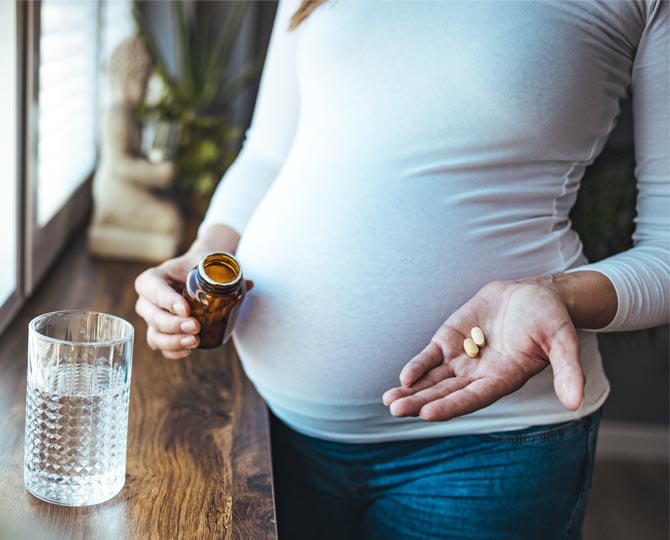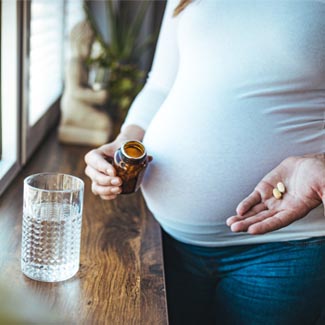Pregnancy brings a cascade of physical, hormonal and emotional changes. While medical care focuses on monitoring fetal development and preventing complications, naturopathy takes a holistic approach to the mother’s overall well-being to complement her care. By providing personalized recommendations regarding nutrition, lifestyle, stress management, and emotional support, naturopaths help ease everyday discomforts, boost energy levels, and guide expectant mothers through the many physiological changes that occur during pregnancy.
Physical changes during pregnancy
In the first trimester (weeks 1 to 13), the body is working hard to adjust as the embryo implants, the placenta begins to form, and the fetus starts developing at a rapid pace. This triggers a sharp rise in hormones like hCG, progesterone, and estrogen, which often causes fatigue, nausea, food aversions, mood swings, and digestive issues.
Energy usually picks up during the second trimester (weeks 14 to 27), but new issues may also crop up. These include ligament pain caused by relaxin (which loosens the muscles and ligaments to prepare the body for childbirth), muscle cramps (from mineral deficiency), fluid retention in the lower body (due to increased pressure on the veins), dizziness (from the higher volume of blood circulating in the body), and constipation (due to the increase in progesterone, which slows digestion).
In the third trimester (weeks 28 to delivery), the growing uterus puts more pressure on the pelvis, which can increase lower back pain. Persistent fatigue is common, since the body is using more energy, gaining weight, and metabolizing at a higher rate. Expectant mothers may wake up frequently because they have trouble finding a comfortable position and the baby is moving more, which impacts the quality of their sleep. Shortness of breath is also more common at this stage, as the uterus pushes up against the diaphragm. Women may also experience light bladder leaks toward the end of pregnancy due to looser pelvic tissues and the extra pressure on their bladders.
Natural remedies to ease discomfort
To help with morning sickness, naturopath Karine Mousseau recommends eating light, frequent meals and pairing them with organic ginger or spearmint—either fresh or brewed as a tea. “Taking a daily dose of 50 to 100 mg of pyridoxal-5-phosphate (P5P), the active form of vitamin B6, is a common recommendation in early pregnancy,” she says. “Low levels of B6 are often seen in pregnant women who experience nausea.”
To ease constipation, expectant mothers should stay well hydrated, eat plenty of soluble fibre, and engage in gentle physical activity. Psyllium can help keep things moving, but some laxatives with senna or alder buckthorn must be avoided, as they can trigger strong intestinal and uterine contractions.
For those dealing with heartburn, digestive enzymes can be taken with meals to help break down food. Chamomile tea may also offer extra digestive relief, especially if stress is making the symptoms worse. “Betaine hydrochloride is a great ally during pregnancy,” says Karine Mousseau. “It helps compensate for the drop in hydrochloric acid. Eating that last meal two to three hours before bedtime can help reduce acid reflux. And drinking less liquid during meals will help keep digestive juices concentrated.”
Nighttime muscle cramps can be relieved with magnesium supplements, light stretching, warm baths to boost circulation, and drinking enough water to keep electrolytes balanced. Magnesium is also known for its role in relaxing the nervous system, improving sleep quality, and reducing irritability.
When it comes to fighting fatigue, natural options can make a difference. “If a woman’s ferritin levels are below 30 µg/L, taking 25 to 30 mg of iron bisglycinate or grass-fed beef liver capsules can help,” says Karine Mousseau. “They’re gentle, easy to digest, and support red blood cell production, which improves tissue oxygenation throughout the body. For better absorption, iron supplements can be paired with vitamin C—either in liposomal form or extracted from acerola or camu camu.” For an even bigger energy boost, she also suggests bee pollen for its rich nutrient content, a B-vitamin complex, or coenzyme Q10, which supports ATP production—the main source of energy for most cellular processes.
The nervous system: An essential consideration
When the nervous system is balanced, stress hormones like cortisol and adrenaline drop, and neurotransmitters that promote well-being, like dopamine, serotonin, and oxytocin, increase. “This balance supports digestion, sleep, emotional stability, and bonding with the baby,” says Karine Mousseau. Simple practices such as prenatal yoga, breathwork, walking in nature, or getting some early morning sunlight can help regulate the nervous system. Getting enough rest, taking breaks during the day, and listening to the body’s natural rhythm will also help expectant mothers recuperate, both physically and emotionally.
Nutrition as the foundation of a healthy pregnancy
Eating well provides the body with the nutrients it needs to stay healthy and energized and support the growing fetus. “In the first trimester, naturopaths will focus on meeting basic nutritional needs with a well-rounded diet and the right supplements,” explains Karine Mousseau. “From the second trimester onward, we pay special attention to blood sugar levels to prevent gestational diabetes.” She adds that staying well hydrated (two to three litres of water per day), eating plenty of fibre, and cutting back on caffeine can help ease common issues during pregnancy, including urinary leakage. Gentle pelvic floor exercises can also help with this particular issue.
Conclusion: A collaborative approach
Naturopathic care takes a personalized, proactive approach to supporting vitality during pregnancy. Depending on a client’s needs, naturopaths may suggest teaming up with other professionals, such as a midwife for prenatal classes, a doula for psychosocial support, a psychologist for emotional well-being, or an osteopath or acupuncturist for physical discomfort. A haptonomy specialist can also help nurture the mother’s connection with her baby. This collaborative, interdisciplinary care can enrich the overall experience and help women feel more supported and peaceful during pregnancy, which is good for both mothers and babies.
Article references
- Karine Mousseau, Naturopath : www.karinemousseau.com
- Canada’s Food Guide. Healthy eating when pregnant and breastfeeding. May 2022.
- Government of Canada. Your Guide to a Healthy Pregnancy. September 2024.
- INSPQ. Pregnancy guide.
- INSPQ. Discomforts of pregnancy.
- INSPQ. Physical changes.
- F Bessaguet, A Desmoulière. Pregnancy physiology. Actualités Pharmaceutiques. September 2023.
- C Body, MD, J A. Christie, MD. Gastrointestinal Diseases in Pregnancy Nausea, Vomiting, Hyperemesis Gravidarum, Gastroesophageal Reflux Disease, Constipation, and Diarrhea. Gastroenterology Clinics of North America. Volume 45, Issue 2, June 2016
- Salari N, Darvishi N, Khaledi-Paveh B, Vaisi-Raygani A, Jalali R, Daneshkhah A, Bartina Y, Mohammadi M. A systematic review and meta-analysis of prevalence of insomnia in the third trimester of pregnancy. BMC Pregnancy Childbirth. 2021 Apr 9
- ML Power, LA Milligan, J Schulkin. Managing nausea and vomiting of pregnancy: a survey of obstetrician-gynecologists. J Reprod Med. 2007 Oct.
- A Steel, J Adams, D Sibbritt, A Broom, C Gallois, J Frawley. Utilisation of complementary and alternative medicine (CAM) practitioners within maternity care provision: results from a nationally representative cohort study of 1,835 pregnant women. BMC Pregnancy and Childbirth. Dec 2012.
- A Rakhshani, R Nagarathna, R Mhaskar, A Mhaskar, A Thomas, S Gunasheela. The effects of yoga in prevention of pregnancy complications in high-risk pregnancies: A randomized controlled trial. Preventive Medicine. Oct. 2012.
- Chandra M, Paray AA. Natural Physiological Changes During Pregnancy. Yale J Biol Med. 2024 Mar.
- AK Malinowski, A Murji. Iron deficiency and iron deficiency anemia in pregnancy. CMAJ July 2021.
- E Teran, I Hernandez, B Nieto, R Tavara, JE Ocampo, A Calle. Coenzyme Q10 supplementation during pregnancy reduces the risk of pre-eclampsia. International Journal of Gynecology & Obstetrics. April 2009
- M Gonzalez, JR Miranda-Massari, J OLALDE. Chapter 9 - Vitamin C and mitochondrial function in health and exercise. Molecular Nutrition and Mitochondria. October 2022
- C. Pecriaux. Place de la vitamine b6 dans le traitement des nausées et vomissements gravidiques. Gynécologie Obstétrique Fertilité & Sénologie. Novembre 2020.
- C Supakatisant, V Phupong. Oral magnesium for relief in pregnancy-induced leg cramps: a randomised controlled trial. Matern Child Nutr. April 2015.
- M Trottier, A Erebara, P Bozzo. Treating constipation during pregnancy. Cam Fam Physician. August 2012.
- L. Ghahramani, SV Hosseini, S Rahimikazerooni. The Effect of Oral Psyllium Herbal Laxative Powder in Prevention of Hemorrhoids and Anal Fissure during Pregnancy, a Randomized Double Blind Clinical Trial. Annals of Colorectal Research. January 2013.
This article provides general information only and does not replace the recommendations or care of a health professional.

